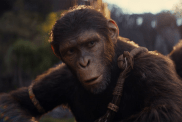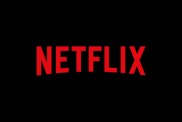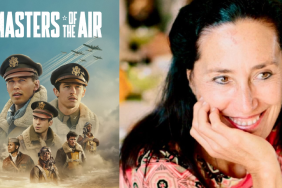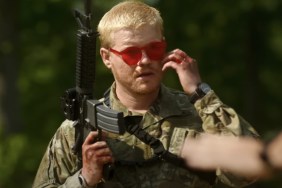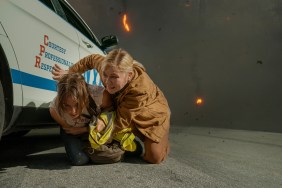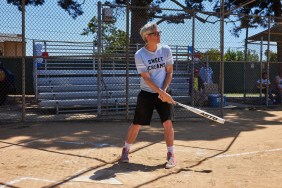Having Jason Statham, Clive Owen and Robert De Niro in your movie may be enough to get people to check out the new Open Road action-thriller Killer Elite when it open in theaters today, but what really impressed us was that it was the debut feature from a director we’d never heard of before, named Gary McKendry. After directing an Oscar-nominated short film called Everything in This Country Must back in 2004, McKendry had mainly been directing commercials, while working on his adaptation of Sir Ranulph Fiennes’ novel “The Feather Men” ever since, and the results are quite impressive.
Set in the early ’80s, Statham and Owen play assassins on opposite sides of a mission to kill a trio of special forces men responsible for killing the sons of a sheikh, and McKendry uses the period to create a distinctive action flick that feels far more real and gritty than other movies we’ve seen.
Since most of Killer Elite was shot in Australia, we figured McKendry was Australian, but we were wrong there–he’s from Ireland–and as we learned when we sat down with him in Toronto, he was quite excited to talk honestly about the things he liked and didn’t like about the process of making a movie over such a long period of time.
ComingSoon.net: How did you find the book “The Feather Men” and how did you get involved with adapting it?
Gary McKendry: I’m an international thriller junkie. I really love those books with the silver cover and the embossed sh*t on it – if it’s a swastika great, if it’s a knife even better. I kind of like those things, and I think it came from traveling a lot in a line of work – in advertising when I was shooting these commercials. I love those pulpy, glitzy books, and this was one of them. My buddy gave it to me, and I had no idea it was such a controversial book. I just read it as a great action-thriller, and then I found out it was true and I thought, “F*ck, even better.” It was like political assassination, secret societies, ex-soldiers murdering people, what’s so surprising about that? I grew up in Belfast and that happened every day. British soldiers were always trying to date my sister, because I grew up in Northern Ireland around the army. I like the SAS. Where I lived, I was on the British side of Northern Ireland, so they were great guys and we really admired them and stuff, and then as I got older I had friends from the other side of the war who hated them, so you begin to realize it’s all about perspective as you got older. That’s what really drew me to the book was, “Who is the good guy?”
CS: That’s one of the things I liked about the movie because the more I think about it, the more I ponder about which side of this conflict is right, because Clive isn’t completely good and neither are the Feather Men, and Jason is still a killer…
McKendry: Exactly!
CS: So you’re watching this and you don’t really know who to root for.
McKendry: And that was the key for me. The film I made is a short that got nominated, the whole key to that was nobody was guilty. Each one did what they did for the right reasons and believed what they were doing is right, and it’s complex. I think that’s part of growing up in Northern Ireland during that. As you get older, you begin to see the people you hated… sh*t, if you were in their position, you would have hated who you are, so for me, what drew me to this film was that Jason and Clive are basically the same guy. I managed to sneak through a big budget action film where there’s no good guy or bad guy, and that’s pretty f*cking good, I think. I mean, that’s what pleases me more than anything. More than the action, more than the great locations, more than making it look like 1980, it’s a movie with no good guy or bad guy. I can’t believe we got it through.
CS: Part of that working is getting Clive and Jason, and I was shocked they hadn’t done a movie together before this, because I feel they’d been in the same general circles over the last 15 years.
McKendry: I know, and I was actually thinking about that. I don’t know if you come from advertising, but have you ever seen the BMW films? You watch these BMW films and that is basically “The Transporter,” but it’s with BMW’s instead of Audi’s. You look at that and you go, “Hang on here a minute. This should have happened a long time ago. Why haven’t you guys met before?” In a funny way, they’re sort of weird shakes, because Jason is famous for his action, not his drama, which I think is really f*cking strong. Look at “The Bank Job,” great! And then you look at Clive and Clive’s a really famous dramatic actor, and then you go, “But hang on, ‘Children of Men’ and you look at ‘Sin City’ and all those kinds of things” and Clive can do action and Jason can do drama, and then these two guys go at it and it was great!

CS: How did you get Robert De Niro? Was it just a matter of sending him the script? I understand this script is something you’ve been working on for a long time.
McKendry: Five years, yeah, six years maybe. I optioned it, and I wouldn’t be doing this but when my short got nominated, I met (producer) Saul Zaentz at a party, and I asked, “Saul, man, how do you do this sh*t? What’s your advice?” And he said, “Ownership is everything. Own the f*cker.” So I optioned this book and it nearly broke me. I tell ya, it wasn’t a cheap option. Every year would say, “Ah, this movie’s never going to get made. Don’t be daft, don’t be stupid.” But the patron saint of directors is “Cool Hand Luke.” “Just keep getting back up,” you know? And that’s been seven years of keep getting back up and taking your lumps, and then I got it to Jason, which was f*cking hard – took me two years to get it to Jason. He got it and loved it. Three days later we met in L.A. at the Beverly Hills polo club or something. Look at me, I fit in there. We met there and he said he would do it, and then we got it up and running, and then I got a phone call from Clive, and he really got it. The thing I love about Clive is with the age of who this guy is. The whole movie is about after. They’re not heroes anymore. It’s after you’re special forces. After you’ve won the medals, after you’ve fought the wars, after you’ve been told you’re the f*cking best, after you’ve lost your job and they’ve taken the uniform. He got all that and I think Clive brought that sort of quiet working class decency to it, but underneath it, there’s f*cking bitter bubbling resentment. He brought that to it, and he was fantastic and I loved it. He got the period totally, and he was quite prepared to embrace things like a dodgy mustache and a f*cked up eye, and also getting into the ring with Jason, ’cause not a lot of actors would get in there and take him on in those sequences. You’ve got a great actor and he’s quite prepared to go toe-to-toe. Like that hospital fight? That’s a big sequence.
CS: The opening sequence makes it seem like this is going to be an ’80s action movie but as it goes along, it turns into something that’s more like the ’60s or ’70s with really gritty action and you start feeling the period more.
McKendry: Yeah, thanks for saying that, but growing up in Belfast, we didn’t have cinemas. All of our cinemas were blown up, so I grew up with movies on the BBC TV that were probably 10 to 12 years old, so I grew up with “Three Days of the Condor” and “The French Connection” when everyone else in the world had seen it forty times. I was seeing it for the first time. I didn’t see “Star Wars” until 10 or 12 after it was made. The first film I ever saw in a theater was the second “Indiana Jones” films so I’ve never seen anything in cinema. Only on TVs and pirated tapes so I grew up with those ’70s movies and that is what I loved. I love “Three Days of the Condor,” “The Taking of Pelham 123,” “French Connection,” f*ckin’ “Day of the Jackal.” You look at those films, I love all those. “Downhill Racer,” you know the skiing movie with Robert Redford? Love those movies! They’re dirty and they’re handheld, and I love the searching for the focus, and I love the way the guys are slightly older in a lot of those films and that fit in with this. These guys are slightly older and I like that grittiness, because New York back then was ugly as sh*t, and London back in 1980 was ugly as sh*t, so that dirtiness was important and a sense of being used up was important. The fights, I was just trying to keep it a little period.
CS: That said, then you went and filmed the whole thing in Australia…
McKendry: I didn’t want to. There’s two big things in this movie that I had no call on…
CS: I had no idea though and I couldn’t tell.
McKendry: No, and I actually worked really, really f*cking hard. I busted my nuts to make sure no one would call it, and I spent a lot of f*cking time picking locations to make it work. When we got started making the movie, we had the whole movie prepped. We shot in London and Morocco with a little piece in Australia, and then there was a switcheroo pulled and everything came to Australia and it broke my heart.
CS: When I heard this was shot there, I assumed you were Australian.
McKendry: (shakes head) I’m typical flotsam and jetsam Irishman. I drifted out of Belfast when I was 18, lived in London, lived in Australia, lived in New York. I’m a New Yorker, and I’m lived up here in Canada a lot doing commercials. No, believe me, it didn’t seem right, but my funding completely fell through twice, and back to “Cool Hand Luke,” “I’m going to f*cking get back up” so I got back up so these guys who took it said, “Let’s go to Australia.” So I was like, “Do I just turn and walk away after all this or do I hang in and make it work?” And you know, what do you do? You gotta hang in and make it work, and you know what it does in a funny way? I found this with commercials. Sometimes limitations force you to work in a certain way, so I wasn’t able to throw the camera around ’cause I go this way and it’s Australia, I got that way it’s a satellite dish. I remember seeing an interview with Kurosawa. There was a beautiful shot, weirdly framed, and they said to him, “Why is it framed that way?” and he said, “Cause if I go that way, it’s Sony Studios and if I go that way, it’s a car park.” We got into that world, so there were a lot of limitations, but I tell you what it did. It forced me to make it a little more intimate. It forced me to shoot a little tighter and a little closer and in a funny way, it made it a little more intimate in getting into guy’s heads. Then the other thing I hate is the title.

CS: I was going to ask about that, because a few people I saw the movie with assumed it was a remake of “The Killer Elite.”
McKendry: Well, some of the internet sites picked that up and were saying that from the very start. I said to those guys, “You should cut that off at the pass.”
CS: But it’s a good title, as long as you don’t realize there was another movie that already used it.
McKendry: I completely agree, because there’s a book actually about the special forces called “Killer Elite” which is a reality book, but it’s because of the movie. The fact is that we didn’t make a movie called “The Feather Men” because it’s nothing to do with that. That’s not what’s attractive. What’s attractive was the relationships between these guys and how the hunter and the guy’s who’s hunting the hunter are the same person. That was what was interesting, and how they’re a community of that 2% of men that are natural killers. Jason’s story is that he doesn’t believe this is what he is. He believes it’s what he does, and he wants to do something else. Clive, this is what he is. So they’re very different, but I was desperate not to use (the title). I mean, Peckinpah is a hero of mine.
CS: Well, even weirder is that a week before this opens, there actually is a remake of a Peckinpah movie, “Straw Dogs.”
McKendry: “What is this a Peckinpah festival?” (We then get into a conversation about Tony Scott remaking “The Wild Bunch,” which was also announced recently.) But no, I hated that title, and it put me in a corner, and we had other titles that we liked, but you know, it’s one of those things when they start getting PR for the title, you can’t stop it. Once that beast is out… “Oh, Jason is doing ‘Killer Elite’… Clive is doing ‘Killer Elite’… Bob is doing it”…
CS: Yeah, well the poster looks great with those three guys and that title.
McKendry: Doesn’t it? And the black and white? I couldn’t believe when I said, “Oh, it should be black and white and they actually did it.
CS: How did your premiere here in Toronto go?
McKendry: I actually felt like a barbarian standing at the gates of Rome. I should have had horns on my helmet. Yesterday was the first time I’d seen it with a big live, real audience, and I’m really happy that not only did they enjoy all the action and violence, but they liked the humor.
CS: It works well, and it must be great to come to the festival when you already have distribution and already have a release date.
McKendry: (laughs) Yeah, you’re not quite as desperate.
CS: So what do you do next? Are you still fairly active in directing commercials or looking for the next project?
McKendry: Listen, that British root is really good, and I think commercials, if you can keep them good, they’re great, because you use good equipment, you try sh*t out, especially post. You know post inside out, and I needed post believe me to make Australia look like England. I know post really well. This film has 700 FX shots in it, but you wouldn’t see it. I would defy anybody to see 50, but I would say you wouldn’t see any more than that. And the whole point of it was to make it invisible. So that’s a great thing about commercials. It keeps you up on all that stuff. You get to experiment, and you get to try sh*t on someone else’s time. You can say, “Get me an Alexi camera, let’s try it out and have some fun.” So all that stuff. After this, we got a couple. The one I’d like to do is the movie I was meant to do before this, which is a hostage story set in the Irish Civil War, which I wanted to make for about 4 million bucks, walking across Ireland with… we had talked with Liam Neeson but it didn’t pan out, and it was harder to get 4 million bucks than it was to get 40, it’s crazy. I would like to do that, though, because it’s so small and intimate and it’s a beautiful story, but still violent. (laughs)
CS: Is that adapted from something?
McKendry: I wrote it from Colum McCann, he wrote that book “Let the Great World Spin” that won the National Book Award this year, and he and I actually wrote the short together that got nominated that I did, so he’s great. He and I see eye to eye – Catholic Irishman, Protestant Irishman, makes for something interesting. So yeah, I’d really like to do that. I would love to do that.
Killer Elite opens today, September 23, nationwide! You can read our earlier interviews with Jason Statham and Clive Owen here.

